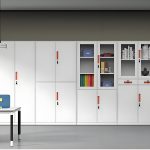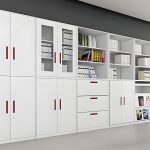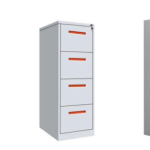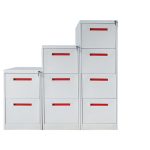Importing steel filing cabinets from China can be a strategic move for your business, offering a balance of cost-effectiveness and quality. However, navigating the complexities of international trade, including customs clearance and quality control, plays a crucial role in ensuring a smooth process.
This guide highlights the key considerations, helping you avoid common pitfalls and build a reliable supply chain.
Getting the Paperwork Right: The Foundation of Smooth Customs
Incorrect documentation is one of the fastest ways to incur delays, extra costs, and even have your shipment rejected. Having a precise and complete set of documents is non-negotiable.
Essential documents you will need include:
- Commercial Invoice: Details the value of the goods, crucial for customs valuation.
- Packing List: Specifies the weight, dimensions, and contents of each package.
- Bill of Lading: The contract between you and the shipping company.
- Certificate of Origin: Proves where the goods were manufactured, which can affect the tariff rates you pay.
A common mistake is using vague product descriptions like "filing cabinets" or "office furniture." Customs authorities require detailed descriptions. Instead, use a precise description that follows a "brand + product name + material + function + model" format. For example, "Dongzhixin, Steel, 4-Drawer Letter-Size Filing Cabinet, Model 123" is far better than a generic term.
Mastering HS Codes and Tariffs
The Harmonized System (HS) code is a universal code that classifies your product and determines the import duties and taxes you will pay. For steel filing cabinets, the correct HS code is typically 8304.00.0000.
Using the wrong code can lead to incorrect duty payments, fines, and seizures. Once you have the correct HS code, you can determine the applicable costs:
- Import Duty: The Most-Favored-Nation (MFN) tariff for steel filing cabinets (8304.00.0000) is 9.0%. However, this can be lower, even 0%, if your country has a Free Trade Agreement (FTA) with China.
- Value-Added Tax (VAT): A 13% VAT is applied to the total value of the goods plus the import duty in China.
Pro Tip: Always consult with a customs broker or use official customs databases to verify the HS code and check for any applicable FTAs that could reduce your costs.
Ensuring Quality and Compliance
Protecting your investment means ensuring the products you receive meet your expectations and legal standards.
- Supplier Verification: Don’t just rely on online profiles. Conduct due diligence on potential manufacturers. Verify business licenses, and if possible, hire a third-party inspection service to check the factory’s production capacity and quality control processes. Choose suppliers who can provide quality test reports from recognized institutions.
- Product Specifications: Be extremely detailed in your purchase order. Specify the type and gauge of steel, the type of finish (e.g., powder-coated), the mechanism of the drawer slides, weight capacity, and locking systems. Reference established technical standards when possible.
- Packaging Requirements: Ensure wooden packaging gets properly treated and marked with the IPPC mark to show it has been fumigated according to international standards. Without this, customs may hold up or reject your shipment at the destination port.
Navigating Shipping and Logistics
Steel filing cabinets are heavy and bulky, making shipping a significant part of your total cost.
Choosing the Right Shipping Mode:
- FCL (Full Container Load): Cost-effective for large volumes. You pay for the entire container.
- LCL (Less than Container Load): Suitable for smaller shipments. You pay for the space you use within a shared container.
Incoterms: Clearly define responsibilities between you and the supplier using Incoterms. For example, FOB (Free on Board) means the supplier is responsible for getting the goods loaded onto the ship, after which you take over the costs and risks. EXW (Ex Works) means you are responsible for the entire process from the supplier's factory door. Understand the risks and costs associated with each term.
Insurance: Always purchase marine insurance for your shipment to protect against loss or damage during transit. Don't assume the supplier's or shipping company's insurance is sufficient.
Planning for Hidden and Unexpected Costs
Beyond the product price and shipping, watch out for these potential hidden fees:
- Customs Broker Fees: While highly recommended, using a broker is an additional cost.
- Terminal Handling Charges: Fees levied by the port for handling containers.
- Demurrage and Detention: These are fees charged by the shipping line if you don't return the container within the allowed free time. Customs delays can easily cause these costly charges.
- Domestic Trucking: The cost to move the containers from the port to your warehouse.
Conclusion: Your Key to Successful Import
Importing steel filing cabinets from China is a structured process that rewards careful planning. By focusing on accurate documentation, correct HS code classification, thorough supplier vetting, and understanding the full scope of logistics and costs, you can mitigate risks and ensure a successful import experience.
When in doubt, investing in a professional customs broker can save you significant time, money, and stress by navigating these complexities on your behalf.





